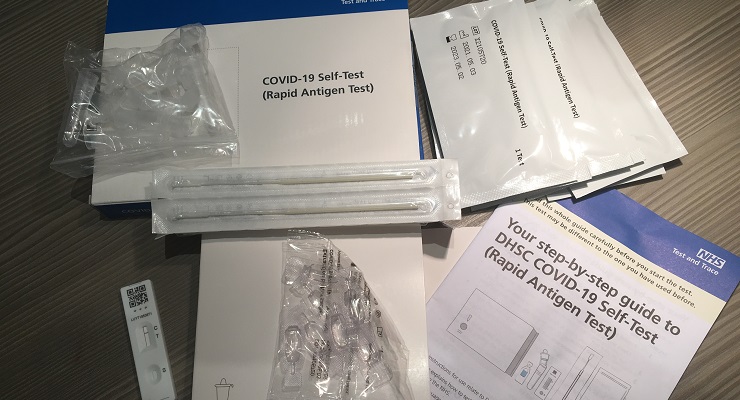
Sometimes It’s the little things that hint at something bigger around the corner. A toilet leak that demolishes the floor of a house. The first inkling of a weather change that unleashes cyclonic fury. A scratchy throat that precedes Omicron.
The rapid antigen test (RAT) falls into that category: a tiny product that can accurately signal the onset of COVID in 15 minutes. And at the moment, a RAT is almost impossible to find.
Chemists can’t provide them. Nor can supermarkets. Online suppliers are unsure when they will see more. Even hospitals are running out as hundreds of thousands of Australians follow health advice and seek a test.
And yet governments continue to tell us to pop out and pick one up, test ourselves and our families at the first sign of COVID symptoms, and then upload our results so they can track the path of this pandemic.
It’s another tiny thing: if you can’t access a RAT, how can you test yourself and upload the results? (And is the tracking of cases and places of contagion totally irrelevant without that information?)
Tiny questions. Tiny facts ignored by government. But over this pandemic they’ve grown into a huge swell of disconnection — between what our governments say (and different governments continue to say different things) and what we’re able to do.
It is that disconnection that is driving an unprecedented lack of trust in those who lead us, and the frustration we are seeing in queues and on Facebook posts where desperate families are offering everything and the kitchen sink in return for a simple test which should be accessible to all. (And that doesn’t even touch on how they should be free for all.)
Let’s just stick with the access issue, because here’s another tiny oversight that’s helping to create a bigger problem.
Early last year, the worldwide launch of a rapid antigen test occurred in Australia. (For transparency purposes, let me declare I was paid to interview the CEO and scientists about it.) The Queensland Deputy Premier and Minister for State Development, Steven Miles, was there too, lauding its development and telling a global audience that it had gained “the health and safety approvals to sell this technology in Europe and the United Kingdom’’.
The product — EuGeni — is being used in Europe, with a production arm set up in Spain to manufacture supplies. Yet this homegrown Australian technology is still not available for use in Australia.
The company behind it — AnteoTech — says it can make millions of 15-minute tests, all carrying an accuracy rate of more than 97%. No one so far disputes that. But here its use awaits approval in Therapeutic Goods Administration land. AnteoTech’s CEO Derek Thomson is careful not to antagonise that process, but you can hear the frustration in his voice.
“We could produce millions; it’s just a matter of how many millions we need,’’ he told Crikey. And he’s baffled why the government wouldn’t be chasing it.
Thomson accepts this model is slightly different — it uses a reader platform, it has a unique detection system, it’s not for use at home — but perhaps that’s the answer to many of our tiny questions. This RAT is manufactured for use by organisations — airports, businesses, hospitals, schools — to conduct ample tests quickly and provide results in 15 minutes.
Imagine how might that affect on another not-so-tiny problem we are seeing: seven-hour testing queues.
Those queues have been inevitable since day dot. The need for rapid antigen tests has been publicised for months.
Yet not one politician is picking up the phone to an Australian company that just might be able to solve the government’s problem.
Perhaps another tiny problem with this government is that they can’t see something is a problem until it whacks it in the face.
Most pundits are starting to think that might be on election day, this year.
Why is Australia seemingly reluctant to solve its rapid antigen test problem? Let us know your thoughts by writing to letters@crikey.com.au. Please include your full name if you would like to be considered for publication in Crikey’s Your Say column. We reserve the right to edit for length and clarity.








There’s some organisation in the USA which looks at how and why some big pharma are able to flood the market with their particular product. Plus keeping costs high. The Sackler family comes to mind with oxycontin sales and deaths.
Could the same be happening in australia with lobby/funds from vested interests?
Does seem clear the fed govt is unable to plan ahead in order to truly aid the Australian public.
Can do capitalism?
Doesn’t work in pandemics!
I’m not sure which USA organisation that would be, but I have read Patrick Radden Keefe’s excellent book Empire of Pain about the Sackler dynasty and how that family’s company Purdue engineered the opiod epidemic, killed hundreds of thousands, made over US$35 billion in revenue over many years and escaped with their loot more or less untouched by any law enforcement. (Though let’s not forget other pharma companies rode on the coat-tails of Purdue to make money from the same well of misery.) The organisation that could and should have stopped the disaster before it even began is the Food and Drug Administration. The Sacklers had an excellent relationship with senior FDA officials all the way back to the days of Librium and Valium, well before their move into opioids. Curtis Wright was the FDA official who worked in close cooperation with the Sacklers while he supervised the smooth, quick and easy path to authorisation of OxyContin in December 1995. He was credited with ‘unparalleled teamwork’ for those efforts. He resigned from the FDA just after and within a year was employed directly by the Sacklers, paid US$400,000 in his first year. Nice work.
I have no faith that Australian regulators are any better than the FDA at keeping a proper distance between themselves and those they are supposed to regulate. My experience, on the contrary, is that the regulators are typically required by their political masters to work in partnership with those they regulate and to always use a ‘light touch’, with predictable results.
What a load of morons we are governed by. Scummo, Domicron. I wonder whose campaign donation this would affect?
Well, Omicron is an anagram of Moronic, after all.
And Delta + Omicron = Mind Control… except that it isn’t.
Blame Muphry’s Law.
Seems to be a similar thing happening with more traditional type vaccines. The mRNA and viral vector types were waved through expeditiously by the TGA, yet the Novavax type (similar tech to the flu jab) has been tied up in TGA approvals for months and months, even though they’re already approved overseas. Surely, if the government is serious about combatting this virus, they’d be using every tool in the kitbag to do so.
It’s not that long. It seems longer because of all the clamour on the TGA’s FB page. It has not been ‘under evaluation’ for longer than the other three approved vaccines were.
Relevance ? It’s well known that the vaccine has had adjuvant, quality and supply issues. Are you suggesting that the TGA do less than an exhaustive evaluation because other regulatory agencies have approved it ?
He’s clearly asking if all candidates are treated equally.
We were using Astra Zeneca for some time without approvals in the US.
Take a chill pill.
Good article with clear and obvious questions for our inept government. I would just take issue with the intro for this article on the Crikey home page – whoever wrote that intro used the phrase “deadly Omicron variant”. This smacks of sensationalising, much like the MSM do. I expect better from you.
Blows my mind really given all the brouhaha over making a second class vaccine here in Oz. Obviously these folks haven’t paid enough bribes to the LNP. And why isn’t the ALP isn’t jumping all over it?
They (the ALP) might be jumping all over it.
But where would you read about it?
I often hear that argument Peril. I don’t buy it. Anything that any of the Labor pollies say is reported by the ABC and there are quite a few online ‘papers’ that would publish such statements including Crikey. Labor has been extraordinarily quiet in the last year.
Alas, not just “…quiet in the last year“!
Certainly since the Scum Miracle of 2019 but many would argue that, because the Rodent clearly spoke to a disturbingly large proportion of the electorate, Bumbler Beasley opted for the small target tactic was the way to go, vanishingly small to human eye though it may be.